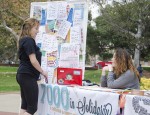Annie E. Clark felt that her school did not treat her report of sexual assault with enough sensitivity, so she became an activist for the rights of students who have experienced sexual assault on college campuses.
“We had people all around the country saying ‘your story is my story, how can I make my campus safer?'” Clark said.
Clark will speak at UCLA Friday about her recommendations to improve sexual assault policies for students and administrators at an informational fair about rights for victims of sexual discrimination.
The event is the last in a week-long series, called Consent Week, aimed at educating students about sexual assault. The week is hosted by a campaign against sexual assault launched last quarter by the Undergraduate Students Association Council Student Wellness Commission and the USAC Office of the President called 7,000 in Solidarity.
On Friday, Clark will share her experiences filing a federal complaint against her university, the University of North Carolina at Chapel Hill, for the alleged mishandling of sexual assault cases.
UCLA’s Title IX officer, Pamela Thomason, will also attend the event to give out information about the school’s legal and counseling services for students who have experienced sexual assault.
Title IX is a federal law prohibiting schools receiving public funds from engaging in discrimination based on sex, which includes sexual harassment or violence. The regulations require every school to have a Title IX coordinator, a policy against sex discrimination and procedures for students to file complaints against sex discrimination.
“Consent week and the campaign are about empowering students to advocate for themselves,” said Savannah Badalich, USAC student wellness commissioner and a leader of the 7,000 in Solidarity campaign. “When (students) actually have this knowledge, they’ll feel more comfortable reporting (sexual assaults).”
Throughout the week, 7,000 in Solidarity has collected pledges from students who vowed to be conscious of the definition of effective consent and to provide a supportive environment for survivors of sexual assault. Badalich said they had collected 400 pledges during consent week as of Thursday night, and about 4,500 since the start of the campaign in fall.
The majority of the 7,000 in Solidarity campaign leaders wore black T-shirts with the phrase “There are no blurred lines when it comes to consent” written on them throughout the week’s events.
This week’s events focused on how distinct groups of people experience sexual assault or harassment differently.
Badalich said student told her they wanted to hear from more points of view in the campaign. To plan this week’s events, Badalich reached out to students of color and lesbian, gay, bisexual, transgender and questioning students to include their voices and concerns.
“If we had a social movement led by a single identity, it wouldn’t be complete justice,” Badalich said.
Each day of the week had a theme, including the representations of gender in the media, LGBTQ youth, undocumented communities and sex trafficking.
At Monday’s event, Badalich made a presentation about online harassment of women. Alexandra Tashman, a Daily Bruin opinion columnist, spoke about the harassment that might be associated with body image.
Arami Walker, third-year world arts and cultures student, spoke about how the media represents women of color. A discussion about the connotations of the word “exotic” was later led by third-year microbiology, immunology and molecular genetics student Ayesha Khan.
At Tuesday’s event, Kate Tungusova, the 7,000 in Solidarity campaign’s sexuality and men as survivors director, added a rainbow pin to her campaign T-shirt to represent the specific concerns of LGBTQ students with regards to sexual assault.
The second-year sociology student spoke about issues such as gender-inclusive bathrooms on college campuses, the creation of safe spaces in student groups and the misconceptions surrounding different types of sexual identities.
“There are people behind the statistics,” Tungusova said, citing data from Boynton Health Service and Centers for Disease Control and Prevention, which found that LGB individuals are at a higher risk for sexual assault. The organizations have not released data on transgender individuals. “They could be people close to you or people you are about to meet. You need to be aware.”
Kiara Lee, a student care manager and advocate at UCLA, works specifically with LGBTQ students as a counselor at Campus Assault Resources and Education. Though people are still learning about her role on campus since she started in November, she already counsels many students, she said.
On Wednesday, The Word, a campus spoken word group, joined the 7,000 in Solidarity campaign to put on a poetry event for about 100 people.
About 25 student performers shared their poems on the theme of silence and sexual violence. Badalich said many students told her they felt inspired to volunteer to share their stories at the end of the event.
“It was cathartic, a lot of students felt comfortable talking,” Badalich said. “It’s hard (for students) to find a space to feel safe to tell their story and not feel judged.”
Badalich told the story of her own experience with sexual assault at the poetry event. She told it again at Thursday night’s Survivor Speaks Out event, where the UCLA Counseling and Psychological Services invited survivors of sexual assault to speak out about their
experiences.
“(The spoken word piece) was the first time I went into so much detail with a large audience,” Badalich said. “My heart was beating so fast. They clap after everyone, but that clap felt like validation.”
